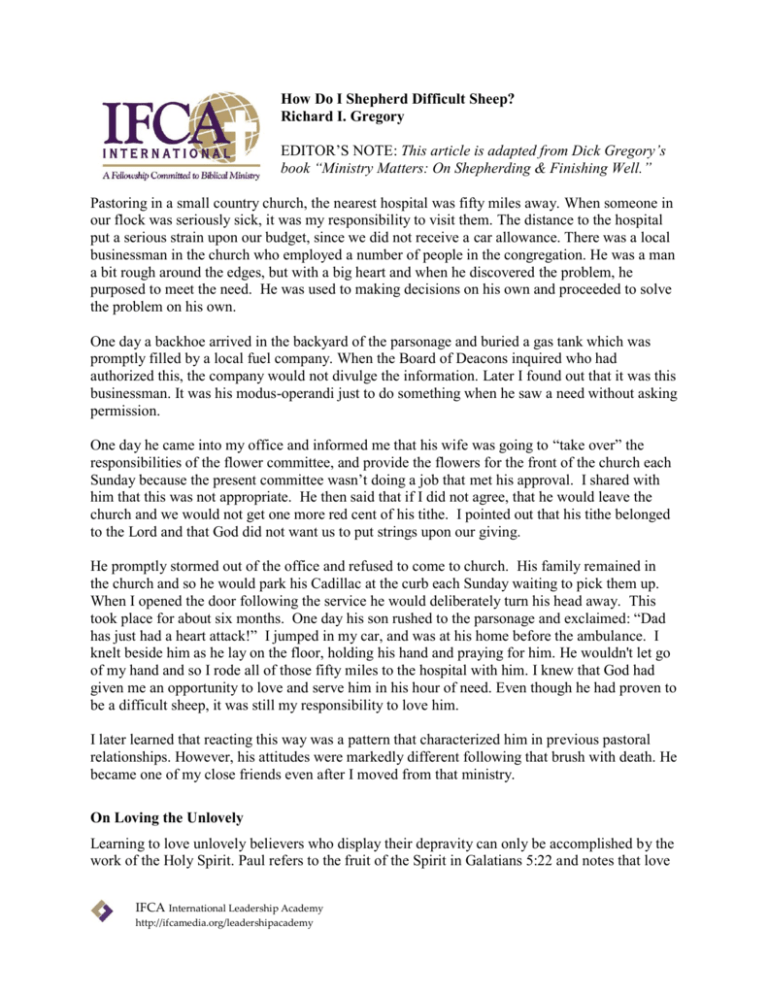How Do I Shepherd Difficult Sheep? Richard I. Gregory EDITOR'S
advertisement

How Do I Shepherd Difficult Sheep? Richard I. Gregory EDITOR’S NOTE: This article is adapted from Dick Gregory’s book “Ministry Matters: On Shepherding & Finishing Well.” Pastoring in a small country church, the nearest hospital was fifty miles away. When someone in our flock was seriously sick, it was my responsibility to visit them. The distance to the hospital put a serious strain upon our budget, since we did not receive a car allowance. There was a local businessman in the church who employed a number of people in the congregation. He was a man a bit rough around the edges, but with a big heart and when he discovered the problem, he purposed to meet the need. He was used to making decisions on his own and proceeded to solve the problem on his own. One day a backhoe arrived in the backyard of the parsonage and buried a gas tank which was promptly filled by a local fuel company. When the Board of Deacons inquired who had authorized this, the company would not divulge the information. Later I found out that it was this businessman. It was his modus-operandi just to do something when he saw a need without asking permission. One day he came into my office and informed me that his wife was going to “take over” the responsibilities of the flower committee, and provide the flowers for the front of the church each Sunday because the present committee wasn’t doing a job that met his approval. I shared with him that this was not appropriate. He then said that if I did not agree, that he would leave the church and we would not get one more red cent of his tithe. I pointed out that his tithe belonged to the Lord and that God did not want us to put strings upon our giving. He promptly stormed out of the office and refused to come to church. His family remained in the church and so he would park his Cadillac at the curb each Sunday waiting to pick them up. When I opened the door following the service he would deliberately turn his head away. This took place for about six months. One day his son rushed to the parsonage and exclaimed: “Dad has just had a heart attack!” I jumped in my car, and was at his home before the ambulance. I knelt beside him as he lay on the floor, holding his hand and praying for him. He wouldn't let go of my hand and so I rode all of those fifty miles to the hospital with him. I knew that God had given me an opportunity to love and serve him in his hour of need. Even though he had proven to be a difficult sheep, it was still my responsibility to love him. I later learned that reacting this way was a pattern that characterized him in previous pastoral relationships. However, his attitudes were markedly different following that brush with death. He became one of my close friends even after I moved from that ministry. On Loving the Unlovely Learning to love unlovely believers who display their depravity can only be accomplished by the work of the Holy Spirit. Paul refers to the fruit of the Spirit in Galatians 5:22 and notes that love IFCA International Leadership Academy http://ifcamedia.org/leadershipacademy is primary. There is always the evidence of the teaching ministry of the Holy Spirit in every true child of God. His teaching Carol and me how to love the unlovely was essential to a ministry among the spiritually immature. While not easy, the proper response to the promptings of the Holy Spirit led us in this transformation from natural resentment to love. One of the primary fruit of the Spirit in Galatians 5:22 is love. The ministry of the Holy Spirit is essential in the life of the spiritual leader. Understanding this role of the Spirit is vital to spiritual stability. It is of critical importance to also recognize that even the most difficult sheep still possess gifts of the Spirit. The maintenance of this perspective greatly assists the spiritual leader in his perspective on loving challenging individuals. If truly a part of the Body, then they are gifted for service in that Body. The Holy Spirit will do His job in every true believer through gentle leading or through the trauma of disciplinary teaching. Hebrews 12:11 speaks to this when it says: “Now no chastening for the present seemeth to be joyous, but grievous: nevertheless afterward it yields the peaceable fruit of righteousness unto them who are exercised by it.” Understanding the Spirit’s role in gifting and disciplining His people provides great freedom to the shepherd. When you understand the Spirit moves in the hearts of difficult sheep, you are free to love and shepherd them after the sovereign leading of the God’s Spirit. On Peacemaking Human beings have an innate ability to be selfish. It arises from our fallen nature. Again it is only the presence of the Holy Spirit enabling believers to seek the unity that overcomes the petty differences that are the source of so many conflicts within the church. Throughout the epistles, Paul cites a number of circumstances where conflict existed within the church of Corinth. Their unity was fractured by believers following after individuals. Some said: “I am of Paul,” while others identified with Apollos, Cephas or even Christ. Paul calls these contentions contrary to the unity that is in Christ (1 Corinthians 1:11-13; 3:4-6). There are other scriptural illustrations of potential problems within the life of the church. At the church in Philippi Paul actually names two women that are at odds in Philippians 4:2. In that passage, he calls upon Euodias and Syntyche to seek the unity of being of the same mind in the Lord. At the church of Rome Paul warned the Roman believers to identify those who cause divisions and offenses contrary to sound doctrine and avoid them (Romans 16:17). How do servant leaders respond when conflict raises its ugly head within the church that the Lord has called them to shepherd? There are several approaches that leaders often take. The Ostrich Approach: Ignore the problem hoping that it will go away. This approach is often taken by those who hate confrontation and will go to great lengths to avoid it. While I understand that actions do affect the body and consequences need to be carefully evaluated, the result of this approach will always produce a quenching of the Spirit of God and will ultimately adversely affect the church's ability to be salt and light in its community. IFCA International Leadership Academy http://ifcamedia.org/leadershipacademy The Iron Fist Approach: The use of your raw leadership authority. This approach confronts and demands that the parties involved repent and be reconciled. Leading by exercising authority always produces resistance. This resistance can manifest itself in an attempt to deflect responsibility based upon what someone else did or said. The very nature of confession is agreeing with what God’s Word says about an attitude or action. Sin must be recognized as sin; but, just calling it sin does not produce repentance. When repentance is demanded the sinner often will provide insincere repentance to avoid consequences or to cover his shame. The Biblical Approach: Become a peacemaker. This approach recognizes that God’s love is showered equally upon those believers on all sides of a conflict. It is important to be convinced of this great truth. None of God’s children are our enemies. They are brothers and as Paul instructs the Thessalonian believers to “Count not a disagreeing brother as an enemy, but admonish him as a brother” (2 Thessalonians 3:15). Paul reminds the Galatian believers: “Am I become your enemy because I tell you the truth?” (Galatians 4:17). When Paul cited the two women in Philippians and encouraged them to be of the same mind in the Lord, he asked “True Yokefellow” as well as Clement and the other believers to help them in their reconciliation (Philippians 4:2-3). True repentance and reconciliation requires personal ministry on the part of a believer, or believers. One must become involved in seeking the unity necessary to overcome unbiblical attitudes that always characterize conflict. Remember, God is never in a hurry. He gives us time to change and uses His servants who come alongside to help that change happen. Being a peacemaker means to treat all sides of a conflict with the same concern and model true humility in seeking the “...unity of the Spirit in the bond of peace” (Ephesians 4:3). One Russian brother noted: “When godly men have the same God, the same Holy Spirit, the same Word of God and the same love for each other, there is no conflict that cannot be resolved in a godly manner.” On Pride As a Source of Conflict A man approached me after the service one Sunday night and informed me that he thought that I was very arrogant because I spoke so definitely about things and he wanted me to know that he knew more about the Word than I did. I told him that I appreciated the fact that he felt he could be honest with me and that I would carefully examine my attitudes. It took him back that I did not react to his accusations but received them in a positive way. I asked him to pray for me that I might be humble and learn from his criticism. It was the first step in establishing a relationship with him and when I retired from that ministry I received a card from him that said that he considered me to be one of the best teachers he ever knew. A humble response to overt pride opened up the door to being able to minister to him. Pride manifests itself in many ways and sometimes it takes an observer to point it out in a person. Leadership needs to recognize that personal criticism is often grounded in something that a person feels justified in pointing out. It may not be the real reason why a person is being critical. Leadership needs to respond to criticism and search for the kernel of truth in the criticism rather than reacting by dismissing it based upon its source. IFCA International Leadership Academy http://ifcamedia.org/leadershipacademy On Power Struggles As a Source of Conflict It is often hard for men who are successful in their endeavors, whether it be business or labor management, to make the transition from being a lone decision maker to being a part of a team where consensus is important and unity is the goal. I remember an individual that was very successful on Wall Street coming to me and informing me that I was not to preach on money since he took care of the finances in the little church where I was the pastor. He said that he would make the decisions on what kind of money the church needed and he would supply the funds needed. I was faced with a power struggle that could have split the church. I asked for some personal time with him and went over my message on giving, sharing with him my view that giving was part of our worship and all should give what they can. I shared that I would not be preaching the whole counsel of God if I neglected teaching on giving. He reluctantly agreed that I should teach but not make people feel guilty if they could not give. Unity, not total agreement was achieved. Power struggles within the Body are a part of nature of our depravity. We like things to go our way and when they don't the natural tendency is to seek out those who agree and try to line up support. This tendency can manifest itself among the people of the congregation and as well as among the spiritual leadership. Dividing the body in this way is always nonproductive in the quest for unity. Building a sense of inter-dependence with good teaching on seeking the mind of the Lord will help believers to resist their depravity and submit to the clear leading of the Spirit in such situations. It is important that spiritual leadership model this humility by not insisting that they always get their way. On Strong Arm Tactics as a Source of Conflict “I’ll show them who is boss.” This can be the by line of those that try to “lord over the flock.” Peter is very specific about the unbiblical nature of this approach. He instructed the elders in 1 Peter 5:2-3: “Feed the flock of God which is among you, taking the oversight thereof, not by constraint, but of a ready mind; neither as being lords over God’s heritage, but being examples to the flock.” Appealing to one’s position and authority does not reflect the leadership style of the Lord Jesus. In fact leading by using your influence will result in followers while leading by using your position or authority will always produce resistance and suspicion. People will tend to react with “Who does he think he is? Just because he is the pastor doesn’t mean...” Influence is summed up in “being examples to the flock.” Authority is summed up in “being lords over God’s heritage.” On Rumors, Lies and Gossip as a Source of Conflict The Lord described Satan as a “liar from the beginning and the father of lies” (John 8:44). Although no believer is our enemy, believers can be used by Satan. He often seduces them into using his methods, one of which is to spread destructive rumors and half-truths. He seduced Ananias and Sapphira to lie to the Holy Spirit about their claims concerning their giving. IFCA International Leadership Academy http://ifcamedia.org/leadershipacademy Paul warns Titus that “Cretans are always liars” and noted that Titus should “rebuke them sharply that they may be sound in the faith” (Titus 1:12). Proverbs, in the section where a father instructs his son, includes a “lying tongue” as one of the six things that God hates (Proverbs 6:17). John lists liars among the most heinous sins in Revelation: “But the fearful and unbelievers, and the abominable, and murders, and whoremongers, and sorcerers, and idolaters, and all liars, shall have their part in the Lake that burns with fire and brimstone: which is the second death” (Revelation 21:8). James points out that sins of the heart are manifested by an uncontrolled tongue. This is the source of great conflict. Jesus said “out of the abundance of the heart the mouth speaks” (Luke 6:45), and James points out that “the tongue is a world of iniquity and boasts great things…It is an unruly evil, full of deadly poison” (James 2:6-8). The words spoken by the tongue can be a blessing or a curse. Believers should pray every day that the Lord would “set a watch, O Lord, before my mouth; keep the door of my lips, incline not my heart to any evil thing, to practice wicked works with men that work iniquity” (Psalm 141:3-4). Proverbs condemns tale bearing and chronicles the result. “The words of a talebearer are as wounds, and they go down into the innermost parts of the belly” (Proverbs 18:8); and makes this observation: “where there is no talebearer, the strife ceases” (Proverbs 26:20). On Dealing with Stubbornness There are some people that will always vote “no” on every issue. Once a man told me that he always voted no as a matter of principle because he believed that nothing should ever be unanimous. I once belonged to a congregation where you could predict the number of “no” votes. My estimate was always within one or two votes on every issue. These were people that did not want the pastor and the elders to have “too much power” and they felt that opposing those things being suggested was a way in which they could accomplish this. Unless the “peacemaker” can establish a working relationship in situations like this, conflicts are always inevitable. The pastor was very gracious in these situations and allowed time and discussion to take place on every issue. When critical or unkind comments were made in a business meeting, he did not put that person down but offered them time to meet with the elders to have their case considered. His patient graciousness eventually dispelled the suspicious attitudes of the “no crowd” and some semblance of unity began to grow. The Essential Ingredient for Unity Paul shares with the believers in Ephesus: “I therefore the prisoner of the Lord, beseech you that you walk worthy of the vocation wherewith you are called, with all lowliness and meekness, with longsuffering, forbearing one another in love; endeavoring to keep the unity of the Spirit in the body of peace” (Ephesians 4:1-3). I believe that this verse identifies the essential qualities in biblical humility. When one “humbles himself under the mighty hand of God” (1 Peter 5:6), he surrenders both his preferences and the results of submitting problems to the Lord for solutions. He does not demand his way but is willing to learn to disagree agreeably and seek the common ground of oneness in the Lord. This is done by recognizing that those who disagree are not IFCA International Leadership Academy http://ifcamedia.org/leadershipacademy enemies but brothers. When two parties both have their eyes fixed upon the Lord they will have a oneness described by John: “That which we have seen and heard, declare we unto you, that you also may have fellowship with us, and truly our fellowship is with the Father and with His Son Jesus Christ” (1 John 1:3). True biblical unity does not demand agreement. It requires the qualities of humility that are characterized by lowliness, long suffering, forbearance and unity. This unity walks hand in hand with biblical love which “seeks not her own and is not easily provoked” (1 Corinthians 13:5), resulting in “being of the same mind in the Lord” (Philippians 4:2). Paul’s ministry was more than teaching the precepts of God’s Word. His personal practice modeled love and concern for God’s people and when he left, those in the church had a deep and abiding love for him. It should be the goal of all spiritual leaders that they finish well and that God’s people are sad to see them go. Dr. Richard Gregory was IFCA International Executive Director from 1987 – 2000. He entered glory July 23, 2013. IFCA International Leadership Academy http://ifcamedia.org/leadershipacademy









